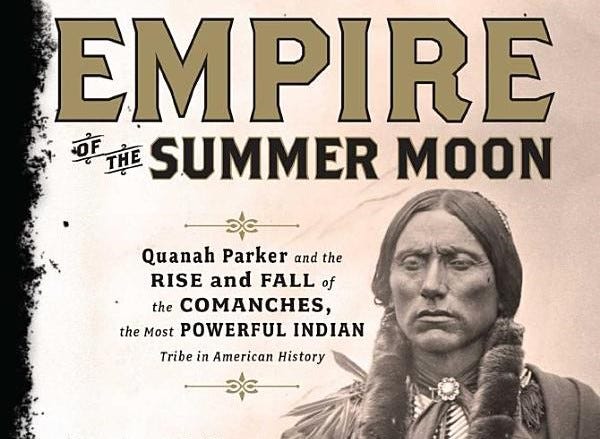Book Review: Empire of the Summer Moon
Author: S.C. Gwynne
Rating: 5.0
Keywords: American West, Indian, Comanche, Texas, History, Native Americans
The southern plains come alive in this telling of the Comanche's fight to remain free in the face of an ever-growing westward population surge. Covering the period just preceding the Civil War to near the end of the century, it is broad in scope while remaining focused on the Comanches, the dominant tribe on the plains, and their fight to endure.
The story begins with the abduction of Cynthia Ann Parker, a young white girl who will eventually become known far and wide as the "White Squaw." Her story weaves its way through the book, ever a connecting thread. We hear much of the brutality of the Comanches, their blood lust, and their skill and bravery in battle. We learn also of the competitions and alliances between other tribes and how the Comanches ruled as the dominate force, turning even the Apache’s into vanquished foes.
As the American nation grew west it would inevitably win the contest, but it was no easy one. It would at times ebb and flow, with the forward migration being rolled back hundreds of miles before a new surge. We may cringe at the unrelenting and brutally vicious toll Comanches would take in and after battle, but we also come to admire their fierce spirit and pride. They were fighting for their very way of life.
And brutal it was, on both sides. Abductions, rape as a weapon of war, grotesque tortures, and unmerciful vengeance were all commonplace. Listening to what pioneers had to endure at the hands of the Comanches erases all doubt about why they wanted to conquer them, and listening to the deception and corruption the Comanches faced in the white man makes their rejection of peace seem sensible. Some of the tortures make you cringe as you read, predictably leading in short order to the devolvement of the white man to a similar hatred and cruelty.
One thing is made very clear: the red man had every reason not to trust the white man. There were men of honor and dishonor on both sides, but in this case, dishonor tended to prevail. Although there were friendships, marriages, and the rare adoption into the community (in both directions), the bigger truth is the uncaring, untrustworthy and incompetent service of government officials at every level. Eventually, the military effort began to turn as the Army learned hard lessons the hard way, by failure after failure, until finally turning to competent leadership. Still, these were hard campaigns. Descriptions of the marches and battles will make you marvel.
On the political front, a sincere and good faith treaty attempt never existed, even though the "Great White Chief" had a policy of peace. When it got too ugly, however, peace was off the table. Finally defeated, tribes were shoehorned into country and lifestyles that were foreign to them. About the only thing they could count on was that nothing promised would be delivered, including food and other basic necessities.
One bit of unexpected history that is included is the founding of the Texas Rangers, as they came to be called. Starting as a vigilante group comprised of uneven character, they matured into an able force. This is but one example of the larger history of the region of which small bits and pieces are made visible.
This is a remarkable book and there is a reason it was a Pulitzer Prize finalist. The writing is superb, bringing to life the harshness and brutality of the wars between the two sides. It gives us a history lesson that includes not only the main protagonists but also the earlier history of the Comanches vis a vis Spain and then Mexico. Colorful characters and the history of the settling of the southwest abound. Finally, when the inevitable came to be, we learn how Quanah, the White Squaw's son who grew to be the Comanche's last chief, turned to accept what could not be changed, often acting with more common sense and integrity than his conquerors.
This book has me looking for others of its ilk. It is a gripping, in-depth, and vivid description of a glamorized time that was everything but glamorous yet was rich in character. Highly recommended for anyone with a remote interest in the history of the settlement of the west.

